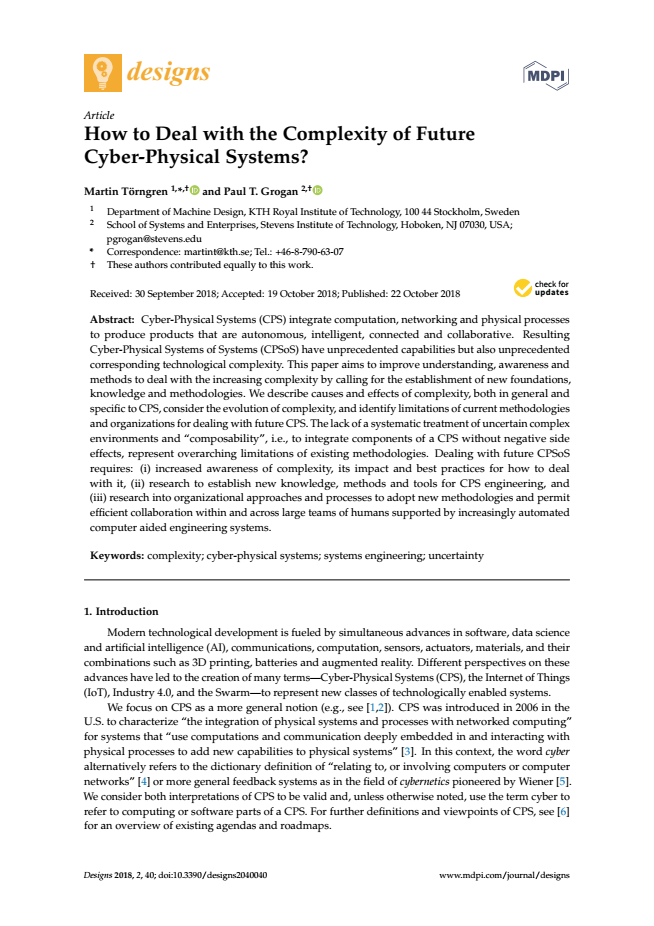A new open access article co-authored with Prof. Martin Törngren of KTH Royal Institute of Technology appears in a special issue of Designs on Challenges and Directions Forward for Dealing with the Complexity of Future Smart Cyber-Physical Systems.
How to Deal with the Complexity of Future Cyber-Physical Systems?
Martin Törngren and Paul T. Grogan
 Abstract: Cyber-Physical Systems (CPS) integrate computation, networking and physical processes to produce products that are autonomous, intelligent, connected and collaborative. Resulting Cyber-Physical Systems of Systems (CPSoS) have unprecedented capabilities but also unprecedented corresponding technological complexity. This paper aims to improve understanding, awareness and methods to deal with the increasing complexity by calling for the establishment of new foundations, knowledge and methodologies. We describe causes and effects of complexity, both in general and specific to CPS, consider the evolution of complexity, and identify limitations of current methodologies and organizations for dealing with future CPS. The lack of a systematic treatment of uncertain complex environments and “composability”, i.e., to integrate components of a CPS without negative side effects, represent overarching limitations of existing methodologies. Dealing with future CPSoS requires: (i) increased awareness of complexity, its impact and best practices for how to deal with it, (ii) research to establish new knowledge, methods and tools for CPS engineering, and (iii) research into organizational approaches and processes to adopt new methodologies and permit efficient collaboration within and across large teams of humans supported by increasingly automated computer aided engineering systems.
Abstract: Cyber-Physical Systems (CPS) integrate computation, networking and physical processes to produce products that are autonomous, intelligent, connected and collaborative. Resulting Cyber-Physical Systems of Systems (CPSoS) have unprecedented capabilities but also unprecedented corresponding technological complexity. This paper aims to improve understanding, awareness and methods to deal with the increasing complexity by calling for the establishment of new foundations, knowledge and methodologies. We describe causes and effects of complexity, both in general and specific to CPS, consider the evolution of complexity, and identify limitations of current methodologies and organizations for dealing with future CPS. The lack of a systematic treatment of uncertain complex environments and “composability”, i.e., to integrate components of a CPS without negative side effects, represent overarching limitations of existing methodologies. Dealing with future CPSoS requires: (i) increased awareness of complexity, its impact and best practices for how to deal with it, (ii) research to establish new knowledge, methods and tools for CPS engineering, and (iii) research into organizational approaches and processes to adopt new methodologies and permit efficient collaboration within and across large teams of humans supported by increasingly automated computer aided engineering systems.
